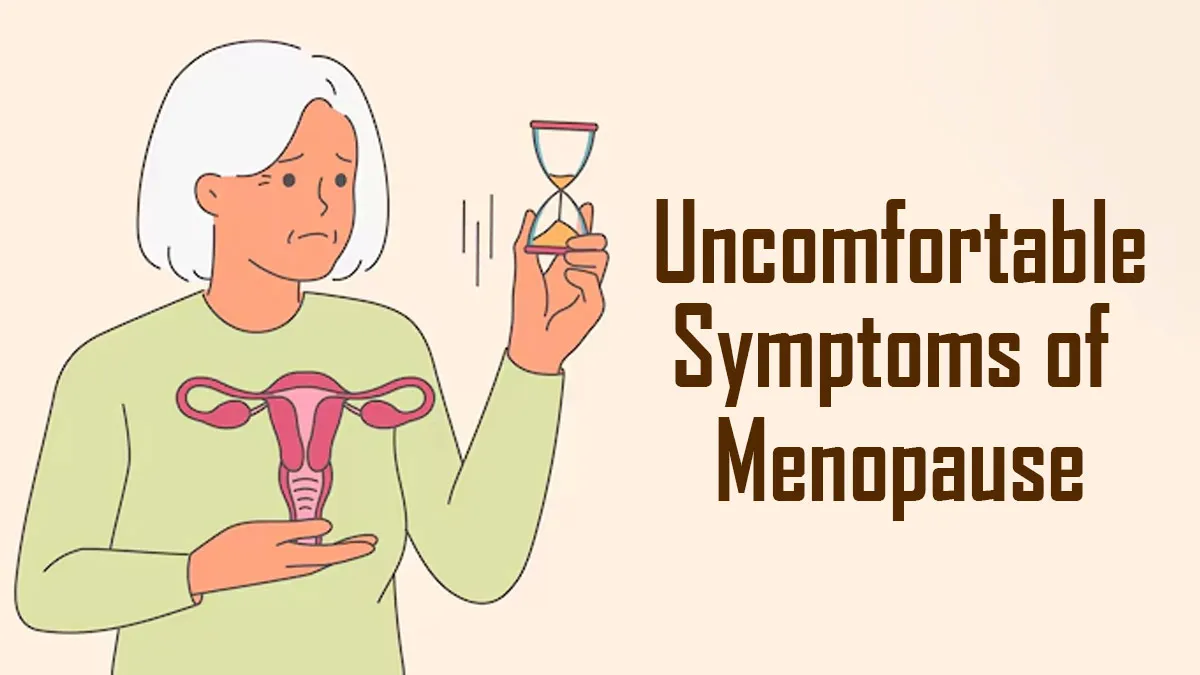
Menopause is a natural stage in a woman's life between ages 45 and 55. It marks the end of menstrual cycles and is caused by changes in hormone levels, especially estrogen. Many women experience uncomfortable symptoms during this time, which can affect daily life and well-being.
Table of Content:-
These changes can be challenging, but understanding them is the first step to managing them effectively. However, the symptoms may be much more than the common ones. An expert discussed the most uncomfortable symptoms of menopause and shared helpful on how to manage these issues.
Uncomfortable Symptoms of Menopause
Dr Neema Sharma, Director and Unit Head Obstetrics & Gynaecology, Fortis Vasant Kunj, explained menopause as a stage when ovaries stop working, and are not producing hormones, due to which the lady does not get periods. “The average age of menopause in India is about 50 to 52 years of age. But if a lady has periods less than 40 years of age, and if we test the hormone and confirm that she has menopause, then it is called premature menopause,” she shared.
Detailing the uncomfortable symptoms of menopause, the expert shared a few problems in women's daily lives.
- Vaginal Dryness: Decreased estrogen leads to irritation and pain during intercourse; treatments include moisturisers and hormonal therapies.
- Loss of Libido: Reduced sexual desire may occur due to hormonal changes; communication and medical advice can help.
- Joint Pains: Hormonal fluctuations can cause stiffness and discomfort in joints; exercise and pain relievers may provide relief.
- Muscular Pain: Muscle aches may increase; gentle physical activity and stretching can alleviate discomfort.
Some of the other symptoms as per NHS, are mentioned below.
- Anxiety: Heightened anxiety and mood swings are common; stress management techniques like mindfulness can be beneficial.
- Discomfort During Sex: Often related to vaginal dryness; using lubricants and engaging in more foreplay can improve comfort.Feelings of Loss of Self: Emotional changes related to ageing may occur; support groups and counselling can help.
- Hair Loss or Thinning: Hormonal changes can lead to thinning hair on the scalp and increased facial hair; treatments include minoxidil or hormone therapy.
- Headaches or Migraines: Fluctuating hormones may trigger headaches; keeping a headache diary can aid in management.
- Increase in Facial Hair: Higher testosterone levels can cause facial hair growth; options include laser removal or electrolysis.
- Palpitations: Irregular heartbeats may occur due to hormonal changes or anxiety; medical evaluation is important if this symptom arises.
- Recurrent UTIs: Decreased estrogen increases susceptibility to urinary tract infections; good hygiene and hydration help prevent them.
- Urge and Stress Incontinence: Hormonal changes may weaken pelvic muscles, leading to incontinence; pelvic floor exercises can be effective treatments.
ALSO READ: Middle Children Are "More Honest, Humble, and Agreeable" Compared To Other Siblings, Claims A Study
Tips To Manage Menopause
-1738299447750.jpg)
Dr Sharma advised women to see a gynaecologist for a complete examination, including ultrasounds, mammograms, and Pap smears. After counselling, the need for hormonal treatment is assessed. Most cases can be managed with lifestyle changes such as regular exercise, a healthy diet, and yoga, which can help alleviate mild symptoms. Some of the other management tips are mentioned below.
- Eat Well: Choose a balanced diet with lots of fruits, vegetables, whole grains, and foods high in calcium like yoghurt and leafy greens. This helps your bones.
- Stay Active: Do regular exercises, especially weight-bearing ones like walking or dancing. This helps you stay fit and feel good.
- Get Good Sleep: Make a calming bedtime routine and keep your bedroom cool and dark for better sleep.
- Manage Stress: Try relaxation methods like yoga, meditation, or deep breathing to reduce stress and anxiety.
- Drink Water: Stay hydrated by drinking plenty of water. Limit caffeine and alcohol to help with hot flashes and improve health.
- Talk to Others: Share your feelings with friends, family, or support groups. Talking can be comforting and helpful.
- Talk to a Doctor: If symptoms are strong, ask your doctor about hormone replacement therapy (HRT) or other treatments.
- Use Moisturisers: For vaginal dryness, over-the-counter lubricants can help. Ask a pharmacist for advice.
- Quit Smoking: Stopping smoking can boost your health and lower risks during menopause.
ALSO READ: Are Your Breasts Producing Milk Without Pregnancy? Here Is Why You Need To See A Doctor
Conclusion
If a patient has serious symptoms that cause depression, they might need hormonal therapy, like menopausal hormone treatment. This treatment is given in low doses for a short time to help with symptoms. It's important for women to work with their doctors to find the best way to manage menopause.
Also watch this video
How we keep this article up to date:
We work with experts and keep a close eye on the latest in health and wellness. Whenever there is a new research or helpful information, we update our articles with accurate and useful advice.
Current Version